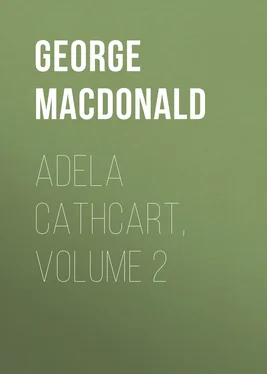George MacDonald - Adela Cathcart, Volume 2
Здесь есть возможность читать онлайн «George MacDonald - Adela Cathcart, Volume 2» — ознакомительный отрывок электронной книги совершенно бесплатно, а после прочтения отрывка купить полную версию. В некоторых случаях можно слушать аудио, скачать через торрент в формате fb2 и присутствует краткое содержание. Жанр: foreign_prose, foreign_religion, literature_19, foreign_antique, на английском языке. Описание произведения, (предисловие) а так же отзывы посетителей доступны на портале библиотеки ЛибКат.
- Название:Adela Cathcart, Volume 2
- Автор:
- Жанр:
- Год:неизвестен
- ISBN:нет данных
- Рейтинг книги:5 / 5. Голосов: 1
-
Избранное:Добавить в избранное
- Отзывы:
-
Ваша оценка:
- 100
- 1
- 2
- 3
- 4
- 5
Adela Cathcart, Volume 2: краткое содержание, описание и аннотация
Предлагаем к чтению аннотацию, описание, краткое содержание или предисловие (зависит от того, что написал сам автор книги «Adela Cathcart, Volume 2»). Если вы не нашли необходимую информацию о книге — напишите в комментариях, мы постараемся отыскать её.
Adela Cathcart, Volume 2 — читать онлайн ознакомительный отрывок
Ниже представлен текст книги, разбитый по страницам. Система сохранения места последней прочитанной страницы, позволяет с удобством читать онлайн бесплатно книгу «Adela Cathcart, Volume 2», без необходимости каждый раз заново искать на чём Вы остановились. Поставьте закладку, и сможете в любой момент перейти на страницу, на которой закончили чтение.
Интервал:
Закладка:
"You are scarcely fair to the profession even as such, Mr. Armstrong," I said.
"That's what I feel about it," he answered. "Look here," he went on, holding out a brawny right arm, with muscles like a prize-fighter's, "they may laugh at what, by a happy hit, they have called muscular christianity—I for one don't object to being laughed at—but I ask you, is that work fit for a man to whom God has given an arm like that? I declare to you, Smith, I would rather work in the docks, and leave the churching to the softs and dandies; for then I should be able to respect myself as giving work for my bread, instead of drawing so many pounds a-year for talking goody to old wives and sentimental young ladies;—for over men who are worth anything, such a man has no influence. God forbid that I should be disrespectful to old women, or even sentimental young ladies! They are worth serving with a man's whole heart, but not worth pampering. I am speaking of the profession as professed by a mere clergyman—one in whom the professional predominates."
"But you can't use those splendid muscles of yours in the church."
"But I can give up the use of them for something better and nobler. They indicate work; but if I can do real spiritual instead of corporeal work, I rise in the scale. I sacrifice my thews on the altar of my faith. But by the mere clergyman, there is no work done to correspond—I do not say to his capacity for work—but to the capacity for work indicated by such a frame as mine—work of some sort, if not of the higher poetic order, then of the lower porter-sort. But if there be a living God, who is doing all he can to save men, to make them pure and noble and high, humble and loving and true, to make them live the life he cares to live himself; if he has revealed and is revealing this to men, and needs for his purpose the work of their fellow-men, who have already seen and known this purpose, surely there is no nobler office than that of a parson; for to him is committed the grand work of letting men see the thoughts of God, and the work of God—in a word, of telling the story of Jesus, so that men shall see how true it is for now , how beautiful it is for ever ; and recognize it as in fact the story of God. Then a clergyman has simply to be more of a man than other men; whereas if he be but a clergyman, he is less of a man than any other man who does honestly the work he has to do, whether he be farm-labourer, shoemaker, or shopkeeper. For such a work, a man may well pine in a dungeon, or starve in a curacy; yea, for such a work, a man will endure the burden of having to dispense the wealth of a bishopric after a divine fashion."
"But your story?" I said at last, unwilling as I was to interrupt his eloquence.
"Yes. This brings me back to it. Here was I starving for no high principle, only for the common-place one of paying my debts; and paying my debts out of the church's money too, for which, scanty as it was, I gave wretched labour—reading prayers as neatly as I could, and preaching sermons half evangelical, half scholastic, of the most unreal and uninteresting sort; feeling all the time hypocritical, as I have already said; and without the farthest prospect of deliverance.
"Then I fell in love."
"Worse and worse!"
"So it seemed; but so it wasn't—like a great many things. At all events, she's down stairs now, busy at a baby's frock, I believe; God bless her! Lizzie is the daughter of a lieutenant in the army, who died before I knew her. She was living with her mother and elder sister, on a very scanty income, in the village where I had the good fortune to be the unhappy curate. I believe I was too unhappy to make myself agreeable to the few young ladies of my congregation, which is generally considered one of the first duties of a curate, in order, no doubt, to secure their co-operation in his charitable schemes; and certainly I do not think I received any great attention from them—certainly not from Lizzie. I thought she pitied and rather despised me. I don't know whether she did, but I still suspect it. I am thankful to say I have no ground for thinking she does now. But we have been through a kind of a moderate burning fiery furnace together, and that brings out the sense, and burns out the nonsense, in both men and women. Not that Lizzie had much nonsense to be burned out of her, as you will soon see.
"I had often been fool enough to wonder that, while she was most attentive and devout during the reading of the service, her face assumed, during the sermon, a far off look of abstraction, that indicated no reception of what I said, further than as an influence of soporific quality. I felt that there was re-proof in this. In fact, it roused my conscience yet more, and made me doubt whether there was anything genuine in me at all. Sometimes I felt as if I really could not go on, but must shut up my poor manuscript, which was 'an ill-favoured thing, sir, but mine own,' and come down from the pulpit, and beg Miss Lizzie Payton's pardon for presuming to read it in her presence. At length that something, or rather want of something, in her quiet unregarding eyes, aroused a certain opposition, ambition, indignation in me. I strove to write better, and to do better generally. Every good sentence, I launched at her—I don't quite know whether I aimed at her heart or her head—I fear the latter; but I know that I looked after my arrow with a hurried glance, to see whether it had reached the mark. Seldom, however, did I find that my bow had had the strength to arouse Miss Lizzie from the somniculose condition which, in my bitterness, I attributed to her. Since then I have frequently tried to bring home to her the charge, and wring from her the confession that, occasionally, just occasionally, she was really overpowered by the weather. But she has never admitted more than one such lapse, which, happening in a hard frost, and the church being no warmer than condescension, she wickedly remarked must have been owing, not to the weight of the atmosphere, but the weight of something else. At length, in my anxiety for self-justification, I persuaded myself that her behaviour was a sign of spiritual insensibility; that she needed conversion; that she looked with contempt from the far-off table-lands of the Broad church, or the dizzy pinnacles of snow-clad Puseyism, upon the humble efforts of one who followed in the footsteps of the first fishers of men—for such I tried, in my self-protection, to consider myself.
"One day, I happened to meet her in a retired lane near the village. She was carrying a jug in her hand.
"'How do you do, Miss Lizzie? A labour of love?' I said, ass that I was!
"'Yes,' she answered; 'I've been over to Farmer Dale's, to fetch some cream for mamma's tea.'
"She knew well enough I had meant a ministration to the poor.
"'Oh! I beg your pardon,' I rejoined; 'I thought you had been round your district.'
"This was wicked; for I knew quite well that she had no district.
"'No,' she answered, 'I leave that to my sister. Mamma is my district. And do you know, her headaches are as painful as any washerwoman's.'
"This shut me up rather; but I plucked up courage presently.
"'You don't seem to like going to church, Miss Lizzie.'
"Her face flushed.
"'Who dares to say so? I am very regular in my attendance.'
"'Not a doubt of it. But you don't enjoy being there.'
"'I do.'
"'Confess, now.—You don't like my sermons.'
"'Do you like them yourself, Mr. Armstrong?'
"Here was a floorer! Did I like them myself?—I really couldn't honestly say I did. I was not greatly interested in them, further than as they were my own, and my best attempts to say something about something I knew nothing about. I was silent. She stood looking at me out of clear grey eyes.
Читать дальшеИнтервал:
Закладка:
Похожие книги на «Adela Cathcart, Volume 2»
Представляем Вашему вниманию похожие книги на «Adela Cathcart, Volume 2» списком для выбора. Мы отобрали схожую по названию и смыслу литературу в надежде предоставить читателям больше вариантов отыскать новые, интересные, ещё непрочитанные произведения.
Обсуждение, отзывы о книге «Adela Cathcart, Volume 2» и просто собственные мнения читателей. Оставьте ваши комментарии, напишите, что Вы думаете о произведении, его смысле или главных героях. Укажите что конкретно понравилось, а что нет, и почему Вы так считаете.












